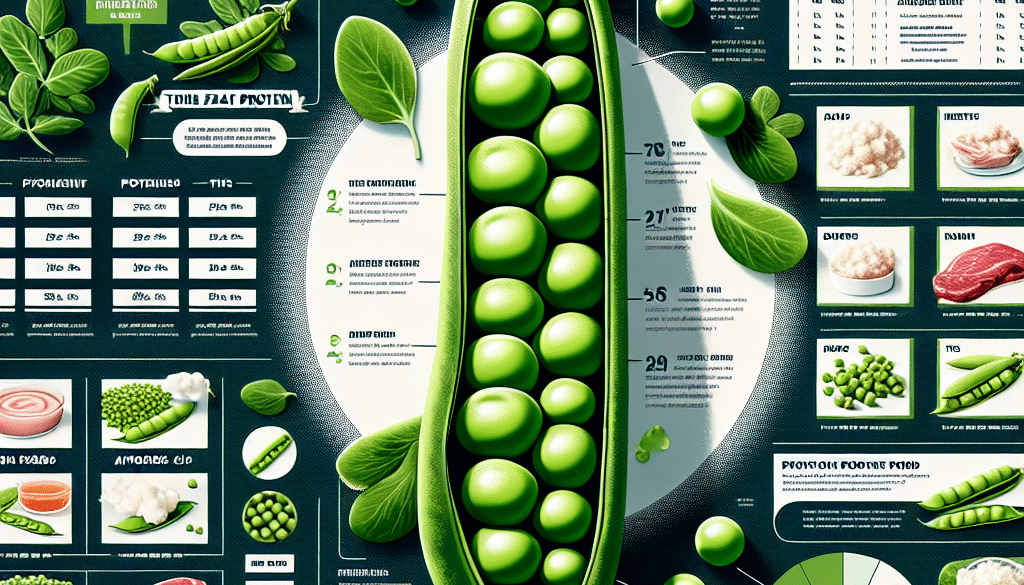Are Peas Complete Protein: The Truth
-
Table of Contents
Are Peas Complete Protein: The Truth

Peas are a popular legume that is often included in various dishes and diets. They are known for their high protein content, making them a favorite among vegetarians and vegans. However, there is a common misconception that peas are a complete protein source. In this article, we will explore the truth behind this claim and provide valuable insights into the nutritional value of peas.
What is a Complete Protein?
Before we delve into whether peas are a complete protein, let’s first understand what a complete protein is. A complete protein contains all nine essential amino acids that the body needs to function properly. These amino acids cannot be produced by the body and must be obtained through diet.
Typically, complete proteins are found in animal-based sources such as meat, fish, eggs, and dairy products. However, there are a few plant-based sources that are also considered complete proteins, such as quinoa and soybeans.
The Amino Acid Profile of Peas
Peas are a good source of protein, containing approximately 5-7 grams of protein per 100 grams. However, when it comes to being a complete protein, peas fall short. They lack one essential amino acid called methionine.
Methionine is an essential amino acid that plays a crucial role in various bodily functions, including the synthesis of proteins and the production of important molecules like glutathione. Without sufficient methionine intake, the body may not be able to function optimally.
While peas do not contain methionine, they are relatively high in another essential amino acid called lysine. Lysine is important for collagen synthesis, calcium absorption, and the production of enzymes and hormones.
Combining Peas with Other Protein Sources
Although peas are not a complete protein on their own, they can be combined with other protein sources to create a complete amino acid profile. By pairing peas with grains or seeds that are rich in methionine, such as rice or quinoa, you can create a complete protein meal.
This concept is known as protein complementation, where two or more incomplete protein sources are combined to provide all the essential amino acids. By combining different plant-based protein sources, you can ensure that you are getting a well-rounded amino acid profile.
The Benefits of Pea Protein
While peas may not be a complete protein, they still offer numerous health benefits. Pea protein is highly digestible and has been shown to support muscle growth and repair. It is also rich in branched-chain amino acids (BCAAs), which are essential for muscle recovery and overall athletic performance.
Pea protein is also a great option for those with dietary restrictions or allergies. It is gluten-free, dairy-free, and hypoallergenic, making it suitable for individuals with celiac disease, lactose intolerance, or food allergies.
Case Study: Pea Protein vs. Whey Protein
A study published in the Journal of the International Society of Sports Nutrition compared the effects of pea protein and whey protein on muscle thickness and strength in resistance-trained men. The study found that both pea protein and whey protein were equally effective in promoting muscle thickness and strength gains.
This study suggests that pea protein can be a viable alternative to whey protein for individuals looking to increase muscle mass and strength. It also highlights the potential benefits of plant-based protein sources for athletes and fitness enthusiasts.
Conclusion
While peas are not a complete protein on their own, they can still be a valuable source of protein when combined with other plant-based protein sources. By pairing peas with grains or seeds that are rich in methionine, you can create a complete amino acid profile and ensure that you are meeting your protein needs.
Pea protein offers numerous health benefits, including muscle growth and repair, and is a suitable option for individuals with dietary restrictions or allergies. Whether you are a vegetarian, vegan, or simply looking to incorporate more plant-based protein into your diet, peas and pea protein can be a nutritious and delicious addition to your meals.
About ETprotein
ETprotein is a reputable protein Chinese factory manufacturer and supplier, renowned for producing, stocking, exporting, and delivering the highest quality organic bulk vegan protein and plant proteins. Their offerings, characterized by a neutral taste, non-GMO, and allergen-free attributes, cater to a diverse range of industries.
ETprotein specializes in exporting and delivering tailor-made protein powder and finished nutritional supplements. Their extensive product range covers sectors like Food and Beverage, Sports Nutrition, Weight Management, Dietary Supplements, Health and Wellness Products, and Infant Formula, ensuring comprehensive solutions to meet all your protein needs.
As a trusted company by leading global food and beverage brands and Fortune 500 companies, ETprotein reinforces China’s reputation in the global arena. For more information or to sample their products, please contact them at sales(at)ETprotein.com today.












